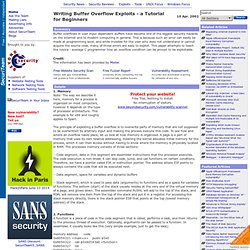

Spatula Tzar. 10 Papers Every Programmer Should Read (At Least Twice) I spent most of yesterday afternoon working on a paper I’m co-writing. It was one of those days when the writing came easy. I was moving from topic to topic, but then I realized that I was reaching too far backward – I was explaining things which I shouldn’t have had to explain to the audience I was trying to reach.
When I first started writing, one of the pieces of advice that I heard was that you should always imagine that you are writing to a particular person. Writing Buffer Overflow Exploits - a Tutorial for Beginners. 1.

Memory Note: The way we describe it here, memory for a process is organized on most computers, however it depends on the type of processor architecture. This example is for x86 and roughly applies to Sparc. The principle of exploiting a buffer overflow is to overwrite parts of memory that are not supposed to be overwritten by arbitrary input and making the process execute this code. Decrypt iTunes and iPod music / unprotect AAC files (m4p. Eleganthack. Hack N Mod - Amazingly Cool Hacks, Mods, and DIY Projects.